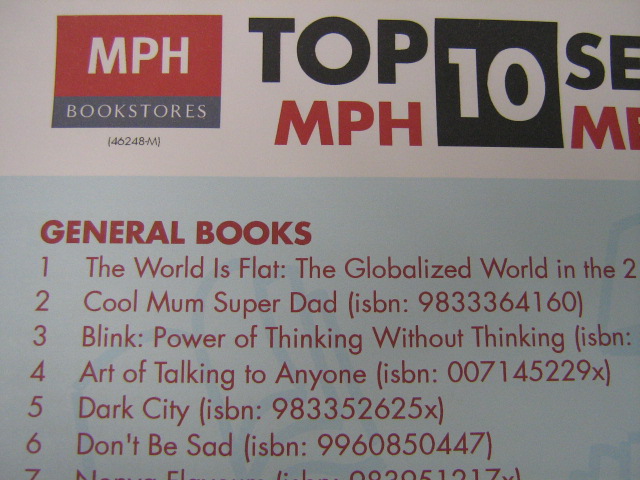How to take (and give) rejection

This is such an interesting topic I just have to blog about it. Ted linked some quotes from a local publisher, basically saying, "Rejection is not about you. It's about your work. You are not good enough yet to get published. So deal with it."
Brutal yes? What if that entire book was your life work and you have just been told it's not good enough? No words of encouragement. No constructive criticism. Just a flat, "No."
Lit agents and publishers call it the 'slush pile.'
I personally believe that if you want to reject someone, it's best to outline to the person:
1. It's the work you are rejecting, not the person
2. If this particular piece of work is not good enough, it doesn't mean your future work will not be good enough
3. These are the reasons: a)....b)....c)
4. BUT you can improve if you do a)....b)....c) e.g: write better grammar, make your sentences simpler, write a more compelling story etc
5. It's not the end of the world. JK Rowling herself was rejected many times.
6. Now, go home and take my advice and polish up your tome. THEN come and see me again when you are ready.
All this can be said fairly nicely. We need to nurture our young Malaysians, not deflate their hopes. (Yeah! The Merdeka spirit!)
I may not be a big time publisher, but I certainly hire people in a big time way (almost every month). Sometimes during the interview, when I decide I'm not going to take someone, I actually tell the person kindly, "You know, You have these good points 1), 2), 3). But you come across as not very energetic/your English is quite bad. That's why I can't take you on. But if you improve on a), b), c), next time I'm sure any company would be glad to have you."



16 comments:
Wow, serious stuff, Dr Xeus. I'd say to a would-be nasty publisher: "Please reject me by all means but don't reject my work." OK, I'm off my rocker but at least it still rocks.
And, yes, you're a very good interviewer (and rejector). (Sounds like a New Age movie title: 'The Rejector')
Thankee Girlie. Maybe Arnold Schwarzenegger should star as The Rejector! (He's already done The Eraser, The Terminator, The Obliterator, The Tipp-Ex etc)
Remember the waitress I told you about when we were having lunch at The Teapot Cafe? She was one of those I told that to.....she has a good science degree from UK, and I still don't understand why her English was so bad!)
Uh oh. Did she serve us? And did you eat and drink the stuff she put in front of you?!
Funny about Arnie. He's not liked at all by some Germans (don't know about Austrians). How about 'The Unlikable' right after he has made 'The Stapler'?
it's good to remember this, isn't it
when i edited a collection of short fiction, it made me sad that i had to tell most of their writers that their work hadn't made it in. in truth i could only select a certain number, and many in the reject pile showed promise. (i did not know the identity of those writers). the same stories might have made it into the next collection if they had been worked on.
and in fact this actually happened with two of the stories.
view your rejected piece as a work still in progress. in prose writing in general the material can always be reworked. (poetry is different, if it stinks you can't fix it)
Argus Lou, lucky she wasn't there that day when we ate! Anyway, I had scones. The only way you can spike scones is the clotted cream! (Curdle it?)
Sharon, very very sound advice. But I think the general consensus is that you reject very nicely....and that you are constructive and nurturing and very very helpful. The main complaints are about someone else...
Then again, everyone's different right?
I wonder if Lillian Too ever had to face rejection :)
Yes, Ms Too too faced rejection at the start of her writing career (couldn't help it, sorry).
I read somewhere long ago that she said the first editor who saw her work complained her language was terrible and impossible to rewrite. Undaunted as she is wont to be, she didn't give up.
I've had lots of rejections from all around the world. Haven't had any rude or insensitive ones yet.
Most people in the publishing industry do have tact. =)
Well Argus Lou, Lillian did say she "wrote a damn good book." I guess she wasn't talking so much about the grammar but the subject matter. Still, hats off to her, she is very successful and she worked hard to deserve her success.
John, you are right :) The word is 'most.'
Posted up an interesting rejection letter that you might want to look at. =)
Head to my blog.
John, that is a wonderful rejection letter (siren! oxymoron spotted!). And your article on the Israel-Lebanon war is pretty good, too. It was easy to follow and digest -- you made a complicated subject pretty clear.
Thank you, Argus. =)
The person who wrote that letter was a woman, by the way. She's probably the closest thing to a mentor I've ever had.
Not only in the publishing world, but in the world at large, how you say it is as important as what you say.
John, women tend to be nicer and more nurturing.
If I may put it this way, rejection is a bitter pill that all writers must take in order to become better writers.
What differentiates the real writers from the 'oh-I-once-wanted-to-be-a-writer-too' type is the fact that former never take rejections as something personal but as a stepping stone to something better.
I too didn't take rejections well, initially. I tended to brood for days but I also never gave up. Above all, I thank all the editors for not giving up on me. Thanks to them, I've published newspaper work that I'm proud of.
Thanks for the post, Xeus.
Hello Xeus! I have something to ask you. Can you please send me an e-mail at yvonnefmn@gmail.com
Thank you!
Yvonne Lee, just the other day, an editor friend of mine mentioned a writer (whom none of us here at this blog knows) who writes for a local newspaper. Apparently, this freelance writer needs a lot of editing, and is thus rejected time and again by this local magazine.
But this writer persisted, wanting to write for the magazine. And of course, because the mag pays well (RM 500 a piece)
Finally, this editor friend of mine told her the truth. And the truth was a bitter pill to swallow for this writer. She was extremely hurt. But she picked herself up after a few months and started contributing again.
Did her work improve? Actually, not yet! But she has the spirit.
I told my editor friend she had to tell the writers early next time, to save everyone a lot of grief and wasted time. She can always say it constructively.
Post a Comment